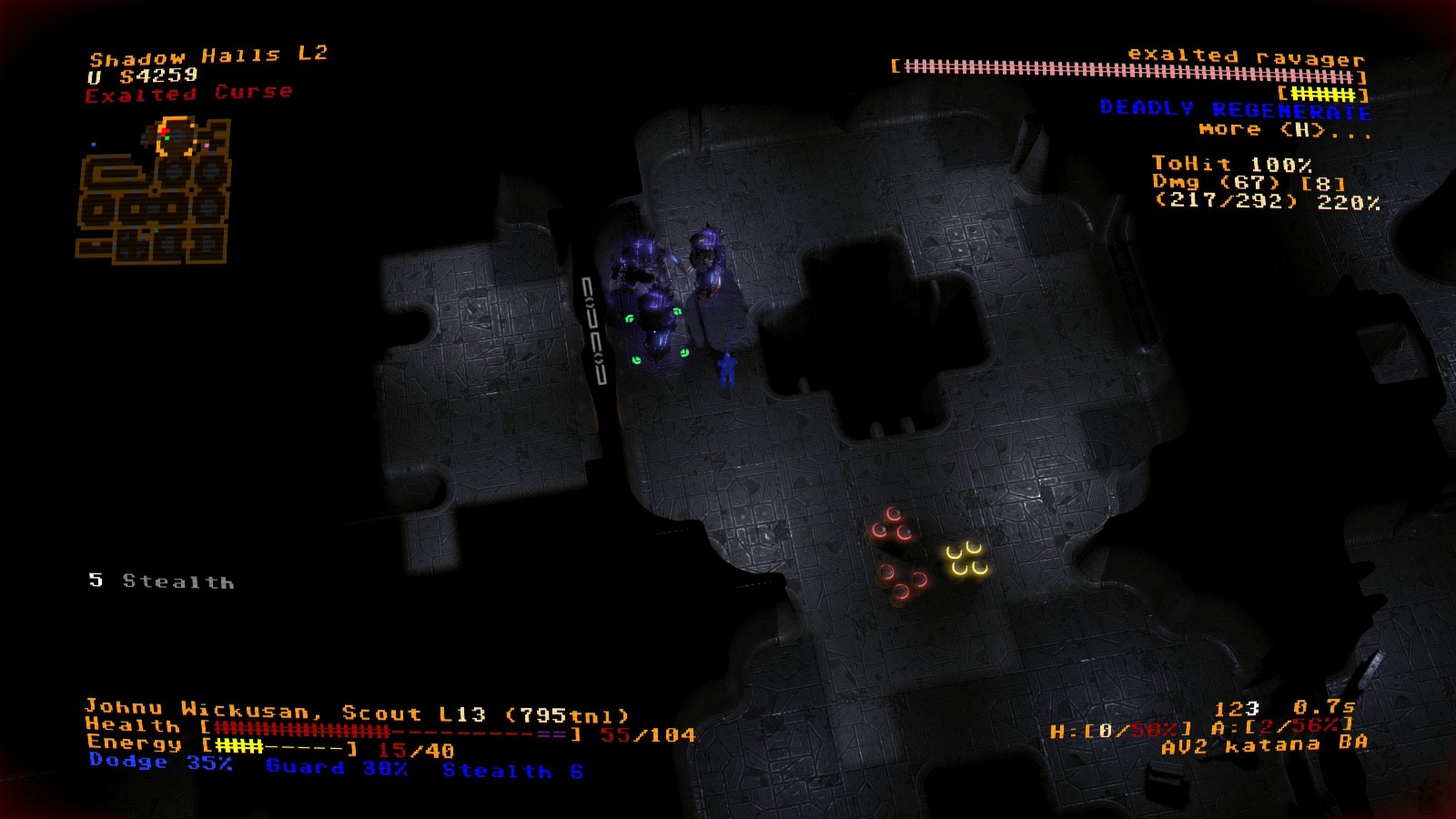- Joined
- Jan 28, 2011
- Messages
- 99,573















Tags: ChaosForge; Jupiter Hell
Roguelikes have never been a primary focus of this website, nor of our chief content officer Darth Roxor, who in fact has very little experience with the genre. As a fan of Doom, one roguelike he has played extensively is DoomRL, the venerable Doom-based roguelike by Kornel Kisielewicz. So it's no surprise that Kisielewicz's DoomRL successor Jupiter Hell was of great interest to him when it appeared on Kickstarter back in 2016. Having played it extensively even before it left Early Access last August, Roxor has now turned in his review of this title, and his verdict is uniformly positive. Here's his appraisal of the game's core combat mechanics:
Read the full article: RPG Codex Review: Jupiter Hell
Roguelikes have never been a primary focus of this website, nor of our chief content officer Darth Roxor, who in fact has very little experience with the genre. As a fan of Doom, one roguelike he has played extensively is DoomRL, the venerable Doom-based roguelike by Kornel Kisielewicz. So it's no surprise that Kisielewicz's DoomRL successor Jupiter Hell was of great interest to him when it appeared on Kickstarter back in 2016. Having played it extensively even before it left Early Access last August, Roxor has now turned in his review of this title, and his verdict is uniformly positive. Here's his appraisal of the game's core combat mechanics:
At a basic level, combat is very similar to DoomRL. Everything is turn-based, you get one action a turn, and the rest of the world moves together with you. Actions take time to perform, the baseline being ‘1 second’, but some are obviously faster than others. If you have a 50% movement speed boost, you’ll be able to take two steps over the same time as it’ll take most other enemies to take one. Managing the time taken to do things is extremely important, as quickness will often allow you to avoid getting whacked.
Guns have accuracy thresholds for distance, with all having optimal and max ranges, and some having minimum range. You will take an accuracy penalty for being at a distance lower than minimum or greater than optimal, while exceeding max range will down your accuracy to zero. One thing I don’t entirely get here is the purpose of optimal/max ranges greater than 6, because 6 tiles is the limit of your view, and you can’t shoot beyond that, even with blind fire. The only exception are shotguns, which aren’t subject to accuracy, and distance only influences their damage, while spraying blindly into the fog of war can actually hurt enemies beyond the 6-tile limit. It can also be extremely effective if you manage to lay your hands on a long-range shotgun.
Where Jupiter Hell strays from its predecessor is in its inclusion of cover mechanics. Anything between you and your opponent will act as cover – this includes props, walls and other enemies. Shooting something behind cover significantly influences accuracy, which makes positioning in combat a vital factor, especially since a number of perks also have an impact on cover, either by reducing it for your targets, or increasing its effectiveness for you. Thus, hunkering down behind some walls, spinning up your chaingun and using an extra action or two to aim can help you withstand even the most unfavourable odds. Similarly, a stupid zombie grunt with a handgun can become a much bigger nuisance when behind cover.
The maps in Jupiter Hell are generally rather tight as well, with big open rooms being a rarity, so cover is something to always keep in mind as you plan your approach. Plus, even in the bigger rooms you’ll find plenty of props, such as chairs or crates, to provide cover, though these are all destructible.
But that’s not to say that (ab)using cover is the ultimate way to go. It’s obviously going to be much less useful if you’re playing a running man. And even if you’re focused on entrenchment, there’s still plenty of things that can smoke you out, particularly acid pools and poison clouds that can be thrown by various enemies. Plus, no matter how much of a living bunker you are, some attacks will still go through and keep chipping away at your health – cover may be important, but it’s still just an individual mechanic, and not god mode, and Jupiter Hell is fortunately not a cover shooter.
Another thing to keep in mind is pain. As you get damaged, you’ll accumulate pain – some enemies even have special abilities that leave you in pain just by looking at you. Pain is a percentage that reduces your accuracy, so the more you get whacked, the worse your performance becomes. In my experience, this mechanic is primarily there to punish your mistakes – if you’re standing in the open like a dumbass, or you keep shooting at a fiend that’s in your face and slashing you, your pain will ramp up, and well, it’s exactly something you deserve. As mentioned before, the marine can cleanse pain and convert it into healing with his special ability, while other classes will have to either wait it out or use a medkit to remove all pain. Oftentimes, waiting it out in the middle of a slaughterfest is not an option.
One thing that I’ve come to realise is a bit of a bummer is that pain applies only to you. The game is generally fair and symmetrical when it comes to its mechanics, but pain is an exception that can sometimes be annoying when facing enemies with high health pools. With more straight-forward builds, the best thing you can do is take cover behind a corner, keep shooting and pray that none of their attacks go through – it feels a little arbitrary, especially when you reach a ceiling where your damage won’t be getting higher, but you’ll still encounter tougher enemies, which leaves you without some additional way to mitigate the risks.
Nevertheless, playing carefully and managing the risks is an important part of Jupiter Hell, since just like most other roguelikes, it’s extremely unforgiving when it comes to dumb mistakes. I’d say that most of my runs are interrupted by a sudden bout of dying due to losing focus. You keep tapping those movement keys like stupid, you run into an armoured ravager, you get blasted with rockets and die. You can’t be bothered to take a step aside and duck behind cover – that former CRI sergeant will be more than glad to spray you with lead. Even worse if you forget about the stuff you’re carrying, and realise only after dying that you could have teleported to safety with a phase kit or run away in a smokescreen. But you were actually too much of a cheapskate to use them, so quit whining.
Guns have accuracy thresholds for distance, with all having optimal and max ranges, and some having minimum range. You will take an accuracy penalty for being at a distance lower than minimum or greater than optimal, while exceeding max range will down your accuracy to zero. One thing I don’t entirely get here is the purpose of optimal/max ranges greater than 6, because 6 tiles is the limit of your view, and you can’t shoot beyond that, even with blind fire. The only exception are shotguns, which aren’t subject to accuracy, and distance only influences their damage, while spraying blindly into the fog of war can actually hurt enemies beyond the 6-tile limit. It can also be extremely effective if you manage to lay your hands on a long-range shotgun.
Where Jupiter Hell strays from its predecessor is in its inclusion of cover mechanics. Anything between you and your opponent will act as cover – this includes props, walls and other enemies. Shooting something behind cover significantly influences accuracy, which makes positioning in combat a vital factor, especially since a number of perks also have an impact on cover, either by reducing it for your targets, or increasing its effectiveness for you. Thus, hunkering down behind some walls, spinning up your chaingun and using an extra action or two to aim can help you withstand even the most unfavourable odds. Similarly, a stupid zombie grunt with a handgun can become a much bigger nuisance when behind cover.
The maps in Jupiter Hell are generally rather tight as well, with big open rooms being a rarity, so cover is something to always keep in mind as you plan your approach. Plus, even in the bigger rooms you’ll find plenty of props, such as chairs or crates, to provide cover, though these are all destructible.
But that’s not to say that (ab)using cover is the ultimate way to go. It’s obviously going to be much less useful if you’re playing a running man. And even if you’re focused on entrenchment, there’s still plenty of things that can smoke you out, particularly acid pools and poison clouds that can be thrown by various enemies. Plus, no matter how much of a living bunker you are, some attacks will still go through and keep chipping away at your health – cover may be important, but it’s still just an individual mechanic, and not god mode, and Jupiter Hell is fortunately not a cover shooter.
Another thing to keep in mind is pain. As you get damaged, you’ll accumulate pain – some enemies even have special abilities that leave you in pain just by looking at you. Pain is a percentage that reduces your accuracy, so the more you get whacked, the worse your performance becomes. In my experience, this mechanic is primarily there to punish your mistakes – if you’re standing in the open like a dumbass, or you keep shooting at a fiend that’s in your face and slashing you, your pain will ramp up, and well, it’s exactly something you deserve. As mentioned before, the marine can cleanse pain and convert it into healing with his special ability, while other classes will have to either wait it out or use a medkit to remove all pain. Oftentimes, waiting it out in the middle of a slaughterfest is not an option.
One thing that I’ve come to realise is a bit of a bummer is that pain applies only to you. The game is generally fair and symmetrical when it comes to its mechanics, but pain is an exception that can sometimes be annoying when facing enemies with high health pools. With more straight-forward builds, the best thing you can do is take cover behind a corner, keep shooting and pray that none of their attacks go through – it feels a little arbitrary, especially when you reach a ceiling where your damage won’t be getting higher, but you’ll still encounter tougher enemies, which leaves you without some additional way to mitigate the risks.
Nevertheless, playing carefully and managing the risks is an important part of Jupiter Hell, since just like most other roguelikes, it’s extremely unforgiving when it comes to dumb mistakes. I’d say that most of my runs are interrupted by a sudden bout of dying due to losing focus. You keep tapping those movement keys like stupid, you run into an armoured ravager, you get blasted with rockets and die. You can’t be bothered to take a step aside and duck behind cover – that former CRI sergeant will be more than glad to spray you with lead. Even worse if you forget about the stuff you’re carrying, and realise only after dying that you could have teleported to safety with a phase kit or run away in a smokescreen. But you were actually too much of a cheapskate to use them, so quit whining.
Read the full article: RPG Codex Review: Jupiter Hell



















![Glory to Codexia! [2012] Codex 2012](/forums/smiles/campaign_tags/campaign_slushfund2012.png)






